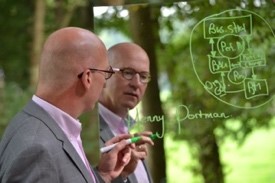ADVISORY ARTICLE
By Henk Venema and Henny Portman
The Netherlands
Introduction
Programs are sometimes seen as a relic from the past; something from the time when we weren’t talking about agile working. In small organizations, this could very well be the case. Working together toward a commonly felt goal is easier when you must coordinate it with a handful of teams.
However, in large organizations, the delivery processes are often longer and more complex. Even if autonomous teams with agile ways of working are already widely used, in the larger organizations many teams will soon have to work together to approach the common goal. And this is often so complex that even in such agile working organizations there is added value in working through a program towards the common goal.
So even though there will be less of a need for a program approach, there will always be a need to organize certain complex changes through a program. But in a way that the benefits of a program organization go hand in hand with the benefits of an agile organization with autonomous teams working in an agile way.
TOAH (The Organizational Agility Heartbeat) is a framework (https://toahframework.com/) that offers clear added value in that area as well. Where organizations with many teams need TOAH to allow the organization’s strategy to emerge through the agile teams via a quarterly rhythm, this same mechanism can be applied perfectly well to programs.
After all, a program is designed to bring about a strategic change, a change that matters, a change that hurts an organization when things are not going well. Think of a change due to changing laws and regulations or a change with a fundamentally different way of approaching the market.
The strategy can often not yet be specified ‘in concrete’. The ‘why’ and ‘what’ questions are often clear, but the ‘how’ question is certainly not yet. And that is precisely the crux of this article. A clear need for a new strategy interpretation in a way that we still (partly perhaps) must invent as an organization.
Experimentation and iterative and incremental work are deeply rooted in the agile way of working of autonomous teams. When this is coupled with a program execution where the delivery of the ‘how’ takes place along incremental paths, this also places demand on the way the program is executed. This will not have to behave along the classical axis of ‘requirements carved in stone’ but as a mechanism that periodically asks itself whether the way in which the change is designed ultimately also realizes the strategy. Or perhaps even make the original strategy change because of advancing insight. A wonderful symbiosis between program coordination and agile execution with a crucial role for TOAH.
This article will explain this through several aspects.
- What is the essence of TOAH?
- What are programs and what added value does a program approach provide?
- How does TOAH connect program coordination with agile execution in the teams?
- How can you use Obeya to make program governance work optimally with agile teams?
- TOAH in collaboration with existing (program) approaches
- AgilePgM
- MSP
- SAFe
The article leads to the following conclusion:
- Even in agile organizations with agile teams, programs continue to have added value, provided that:
- The program execution leaves the HOW to the agile teams
- Program execution intertwines with scaled agile processes
- TOAH is the link between programs and agile teams
- Both methodological (TOAH and agile program management)
- As in practical execution
- TOAH provides a pragmatic tool within existing program management methods such as AgilePgM and MSP to ensure a recognizable delivery pattern of business skills where tranches are synchronized and within tranches periodic adjustments are possible.
More…
To read entire article, click here
How to cite this article: Venema, H. and Portman, H. (2021). TOAH and Programs, PM World Journal, Vol. X, Issue VIII, August. Available online at https://pmworldlibrary.net/wp-content/uploads/2021/08/pmwj108-Aug2021-Venema-Portman-TOAH-and-programs-advisory.pdf
About the Authors

Henk Venema
The Netherlands
![]()
Henk Venema is partner at Inspinity. The leadership purpose of Henk Venema: navigating the expedition into unchartered territories and enjoying the journey more than the destination. Henk is an experienced change manager with a focus on helping organizations transform to become more agile. This experience is built on many years of experience in portfolio, program and project management. A lot of experience in large and complex organizations in the financial sector. Able to build bridges between the business and IT worlds in organizations. Because of the close partnerships that arise from this, able to give substance to strategically important change programs.
In recent years, he has focused mainly on change programs aimed at making organizations more agile. Agility that is needed to cope with rapidly changing circumstances. Led large-scale change programs in this area with a focus on simultaneously changing the organizational model, collaborative processes and mindset. He has also specialized in program management in organizations working with autonomous teams and scalability issues. Henk can be contacted at venema@inspinity.nl

Henny Portman
The Netherlands
![]()
Henny Portman, owner of Portman PM[O] Consultancy and was partner of HWP Consulting, has 40 years of experience in the project management domain. He was the project management office (PMO) thought leader within NN Group and responsible for the introduction and application of the PMO methodologies (portfolio, program, and project management) across Europe and Asia. He trains, coaches, and directs (senior) programme, project and portfolio managers and project sponsors at all levels, and built several professional (PM(O)) communities.
Henny Portman is accredited in a variety of qualifications, including P3O, PRINCE2, MSP, MoP, PRINCE2 Agile, AgilePM, AgilePgM and AgileSHIFT trainer and an SPC4 SAFe consultant and trainer. He is a P3M3 trainer and assessor and PMO Value Ring Certified Consultant (PMO Global Alliance). On behave of IPMA, he assesses mega and large projects for the IPMA Project Excellence Award. In addition to this, he is an international speaker and author of many articles and books in the PM(O) field and blogger (hennyportman.wordpress.com). Henny can be contacted at henny.portman@gmail.com.









